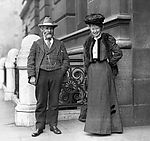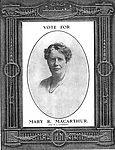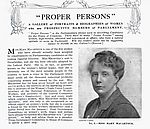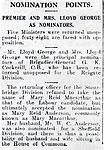 Mary photographed here with Keir Hardie in 1914
Mary photographed here with Keir Hardie in 1914 General Election 1918
General Election 1918 Article in Gentlewoman 14.12.1918
Article in Gentlewoman 14.12.1918 Extract from Mary's election address
Extract from Mary's election address News report - Election Defeat
News report - Election Defeat News report - Why the Women Failed
News report - Why the Women Failed News report - Mary Unable to Use Maiden Name
News report - Mary Unable to Use Maiden Name News report - Mary's Cheery Views on Election Defeat
News report - Mary's Cheery Views on Election Defeat News report - Mary's Cheer Up Message
News report - Mary's Cheer Up Message Election Defeat Dinner
Election Defeat Dinner

In 1918 laws were passed, which allowed women to stand for Parliament for the first time ever. Only women over the age of thirty were allowed to vote. They had to be householders, married to a householder or pay more than £5 a year in rent. Mary Macarthur was amongst the first to stand, one of sixteen women, who secured nominations for the Labour Party. The images reproduced here tell some of the story of her campaign and subsequent defeat.
Mary was officially adopted as Labour candidate for the Stourbridge area. She was well known and respected in the area, particularly for her union work and her support of the Cradley Heath women chainmakers. An article in "The Gentlewoman" described her as "obviously one of the most suitable people in the country to have a vote in Parliament, which must settle all the thousand industrial problems concerning women, caused by the war."
Mary stayed with a local family for nearly a month while she was campaigning. Every day she was out, knocking on doors, trying to persuade people to vote Labour. Mary's manifesto was circulated in a letter, sent out from Stourbridge's Cooperative Rooms. It was just before the end of the war, and showed very real concerns of a war weary nation. In it Mary called for the speedy return of the soldiers and sailors, with proper work found for them; women to be entitled to a man's pay if she was doing a man's work; equal access to education from nursery school to university, with financial support for the less well off; well planned and healthy houses at reasonable rents; the abolition of the workhouses and increased old age pensions payable at 60.
Mary was defeated by the Liberal candidate, the Right Honourable J.W. Wilson, a large employer in the district who, it seems, commanded the loyalty of absent voters; those men not yet returned from the war. Mary came second of three in the poll, with 7,587 votes, just 1,333 less than the successful candidate.
All of the woman Labour candidates were defeated. There is a photograph shown here of the women being entertained to dinner at the Lyceum Club. The first and only woman elected that year was Constance Markievicz, the Sinn Fein member for Dublin, while still in Holloway prison for alleged dealings with the Germans. She was released in 1919, but refused to take her seat. The first woman actually to sit in the Commons was Nancy Viscountess Astor, elected in 1919.
There were a number of factors contributing to the women's defeat.The Bill enabling women to stand for the first time was only passed five weeks before the election, leaving little time in which to get formally adopted or to campaign. The whole idea of women standing for Parliament was new, and would have taken some getting used to. A significant number of women, who might have been more inclined to vote for a woman, still did not have the vote. Unlike the male candidates, there was little or no established campaign organisation to support the women. Only Christabelle Pankhurst, standing in Smethwick, had an organisation, her own, all women. She polled the highest of any woman, but was still defeated.
Mary's pacifist views could have contributed to her defeat. She also had a special handicap. The Returning Officer for her district would not allow her to go to the polls under the name of Macarthur, by which she was so well known. On the ballot paper she was obliged to use her married name, Anderson,which she only used in private, and which was unfamiliar to the people with whom she had worked. It is interesting to note, however, that in Mansfield, Miss Violet Markham was allowed to use her maiden name, rather than her married name of Carruthers.
Despite the defeat Mary remained positive. When thanking her supporters Mary drew attention to the two women who had been cleaning the hall where the meeting was held since one o'clock that day, a labour of love. She also said that she, "should never forget the young men who carried people on their backs to the poll, that was more for the cause than the other people with all of their vehicles." She believed that as long as the movement had such people of character in it, the Labour Party would be bound to succeed.
Mary's husband, Will Anderson, Labour candidate for Attercliffe in Sheffield, was also defeated. Mary sent him a telegram, "Cheer up! Better right than top!" She said that she would gladly fight again as the Labour candidate, if the Party wanted her to. If they chose another, she promised that she would fight for their choice. Unfortunately, Mary never had the opportunity. She was diagnosed with cancer and died two years later, at the very height of her powers.
Rollover the captions in the box to see the available images in thumbnail format, click the caption to see the full-size image
| Reference: | 710 |
| Keywords: | |
| Archive Ref: | |
| Updated: | Thu 18 Oct 2007 - 1 |
| Interpretation written by | Barbara Harris |
| Author's organisation | |
| Organisation's website |